Table of Contents
Let’s keep it simple, understanding the fundamentals of B2B keyword research is vital for two things: increasing leads and revenue. If relevant users can’t find your site, whether that be through poor optimization or marketing towards the wrong target audience, they won’t be purchasing your products or services. Lucky for you, GFD has specialized in B2B SEO services and research for years, and we’ve compiled a guide for you to follow in your valuable pursuit for more visibility on the web.
The Importance of B2B Keyword Research
B2B keyword research is a set of strategies aimed at improving the visibility and ranking of specific queries targeted towards other businesses in the SERPs. The primary goal, and the overall importance of B2B SEO, is to attract more organic traffic, increase high-quality leads and sales. In the process you’ll also be able to inform yourself on potential customer needs and gain knowledge on competitor offerings and the overall competitor landscape — which should not be overlooked.
Key B2B Factors to Keep in Mind
One of the first steps of conducting B2B keyword research is being aware of the challenges and fundamental differences it has from B2C or Business-to-Consumer. B2B marketing requires you to reach an audience responsible for making purchasing decisions within another business, which presents a unique hurdle compared to B2C. We’ve identified some key areas below to keep in mind before conducting any specific keyword research.
- The Target Audience: In B2B, you may not just be targeting an individual consumer, but instead a group within a company. This means you have to consider various perspectives, needs, and preferences. You must be aware of the decision-makers and end-users within the organization and tailor your keyword strategy to address their specific needs.
- Ideal Customer Profile (ICP): Defining your ideal customer profile is a fundamental step in B2B keyword research. You need to identify the types of businesses that would be the best fit for your product or service. This involves understanding the industry, potential company size, or budget constraints to ensure you’re targeting a potential customer that’s an ideal match.
- Longer Buyer Cycle: B2B sales cycles are typically longer and more intricate compared to B2C. The decision-making process in B2B often involves multiple stages, from initial research to evaluation, negotiation, and final purchase. Being aware of these hurdles and nurturing leads over an extended period requires a nuanced keyword strategy to keep prospects engaged.
- Competitive Landscape: B2B markets are often highly competitive, with many businesses vying for the attention of a relatively smaller pool of potential customers. Analyzing what keywords your competitors are targeting and where you can differentiate yourself is a great strategy to keep in mind. This often leads to targeting long-tail keywords and straying away from some of the broader queries with large amounts of reported monthly search volume.
- Specific Language: B2B audiences often use industry-specific terminology and, to be effective, your keyword research needs to encompass these unique phrases. Understanding the language of your audience can be difficult at first, but will later on demonstrate your expertise and understanding of their challenges.
- Content Quality: B2B audiences typically seek in-depth, authoritative content. This means your keyword strategy will need to create high-quality, informative content that addresses the pain points and aspirations of your target audience. Doing this will also allow your topical authority to grow, which can be another key factor in determining your success in rankings for relevant, competitive queries.
Understanding Search Intent and Targeting the Right Audience
If you’re starting from ground zero, a great way to get a solid foundation is to review competitor content with similar offerings. You can use tools such as Ahrefs, which I’ll go into more detail below, to identify keywords their pages are ranking for. By analyzing their service pages — and potentially their top ranking blog content if you are attempting to boost your topical authority — you’ll be able to identify a handful of keywords that you can then export and begin to review.
However, to ensure you are targeting the right audience that’s ready to buy or invest into one of your services you must be aware of each query’s search intent. The term sounds scary but, in reality, manually reviewing the SERPs for specific keyword results is a solid way to identify intent. To start, you’ll need to understand each of the four main kinds of intent.
- Informational Intent: Queries for this intent can often be identified with modifiers such as “what is,” “how to,” or use “when” or “where” in the search. In summary, the user is looking for information to solve their problem or answer their questions, which usually means blogs, listicles, or resource pages will be ranking for these queries. Transactional Intent: Transactional intent is exactly what it sounds like — a user who is looking to make a purchase. When queries are searched with modifiers of “buy,” “for sale,” “services” or sometimes “solutions,” they typically have transactional intent. However, always double check manually as I’ve seen instances of queries, such as project management solutions, result in listicles. Whereas the service modifier results in service pages.
- Transactional Intent: Transactional intent is exactly what it sounds like — a user who is looking to make a purchase. When queries are searched with modifiers of “buy,” “for sale,” “services” or sometimes “solutions,” they typically have transactional intent. However, always double check manually as I’ve seen instances of queries, such as project management solutions, result in listicles. Whereas the service modifier results in service pages.
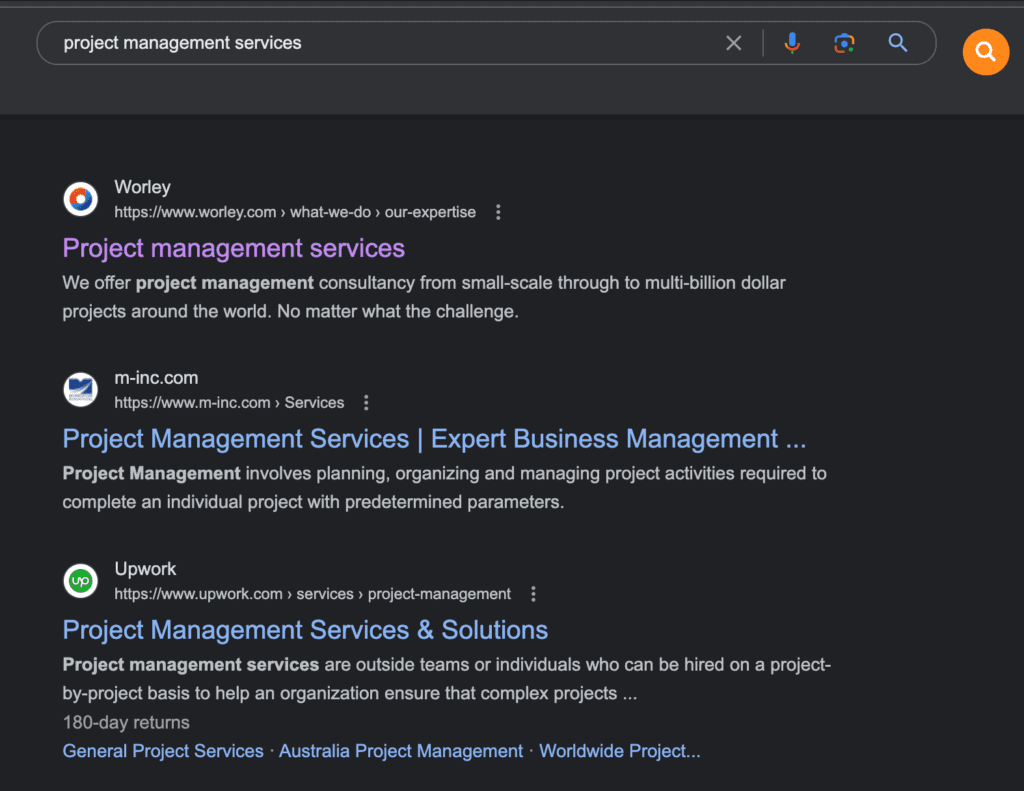
- Commercial Intent: Commercial intent can be viewed as the middle ground between informational and transactional. The user is clearly interested in making a purchase, but still requires more convincing. This intent typically results in reviews or comparison pieces.
- Navigation Intent: Lastly, navigational intent refers to when a user is searching for a specific page, In these instances, they already know what they want and what they are looking for. This can oftentimes be reflected in branded queries such as “IGN reviews” or “Starbucks menu.”
Tools to Help Conduct B2B Keyword Research
As briefly stated before, conducting B2B keyword research typically requires you to target hyper-specific keywords unless you are a major site with high-authority. How you specifically conduct your research may slightly vary depending on the organic state or progress of your site. As mentioned above, competitor reviews can be a perfect place to start your analysis. However, if you have substantial traffic, another avenue to identify some long-tail keywords is by using Google Search Console and Regex filters. This will not only allow you to find queries to optimize for, but also help identify intent.
Google Search Console
Firstly, travel to performance on the left side of the screen and click search results.
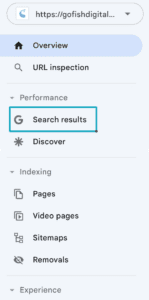
This will then display the overall clicks and impressions your site has received for the last 3 months by default. The timeline can be changed, but we want to focus on adding a new filter first. You can do this by clicking new+ → queries → custom(regex). You will then be prompted to add a formula.
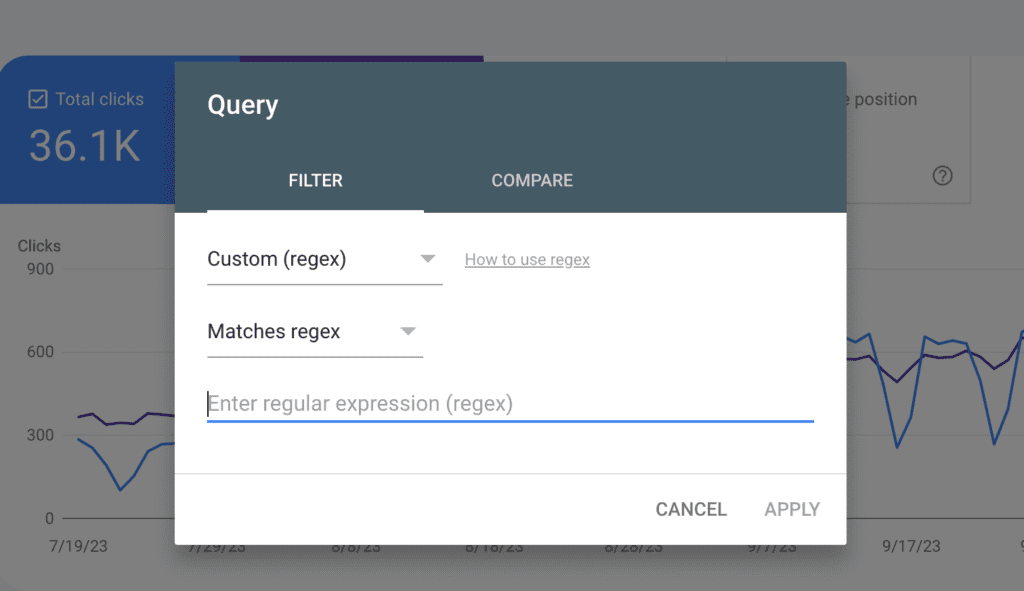
To create a custom regex formula, use the format: “pattern1|pattern2|pattern3,” where the vertical bar (|) functions as an OR statement, allowing your formula to match multiple variants of a given pattern. For instance, if you want to capture variations of “SAAS Services” your formula could appear as:
SAAS Services|SaaS Services|saas services|SaaS service|saas service|SaaS offerings|saas offerings
You can then use the results to identify potential transactional keywords your site is already receiving impressions and clicks for and optimize accordingly. Additionally, if you are building out your topical authority on certain relevant subjects, and want to identify potential keywords to optimize your blog for, you can use a formula such as:
what|how|when|why
Using GSC is vital to empowering your B2B keyword research, but Ahrefs might be a better tool if you need to identify brand new keywords.
Ahrefs
There are a couple ways to get your foot in the door with Ahrefs. One way is to identify your key service that you want to optimize for, and start with a root term. Let’s say for instance you have a page targeting cloud management services. You could go to the keyword explorer section in Ahrefs, type in the keyword and then search.

Next step is to click and view the matching terms section, which will display various related keywords, and a section to the left that will break it down into bucket’s of related terms.
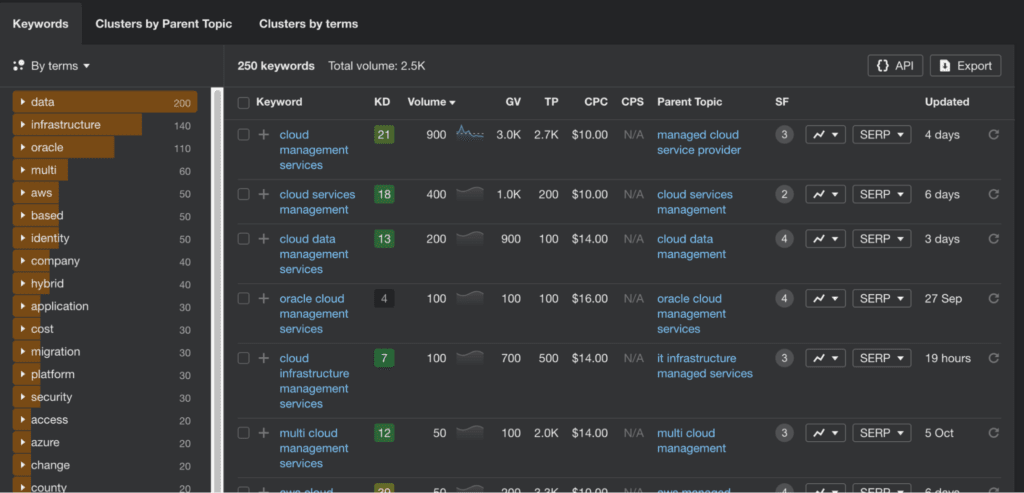
Depending on your query, this can be a gold mine for long-tail keywords and a good place to learn how people or other businesses are searching for the topic. For instance, we can see that data is the most common modifier to include with the query cloud management services. We can then use this as a jumping off point to better understand if this is a keyword our company should be targeting.
Ahrefs will display top ranking pages, we can easily manually search to find the results as well, which shows that the top 5 results favor informational intent, while the bottom five feature service and solution pages.
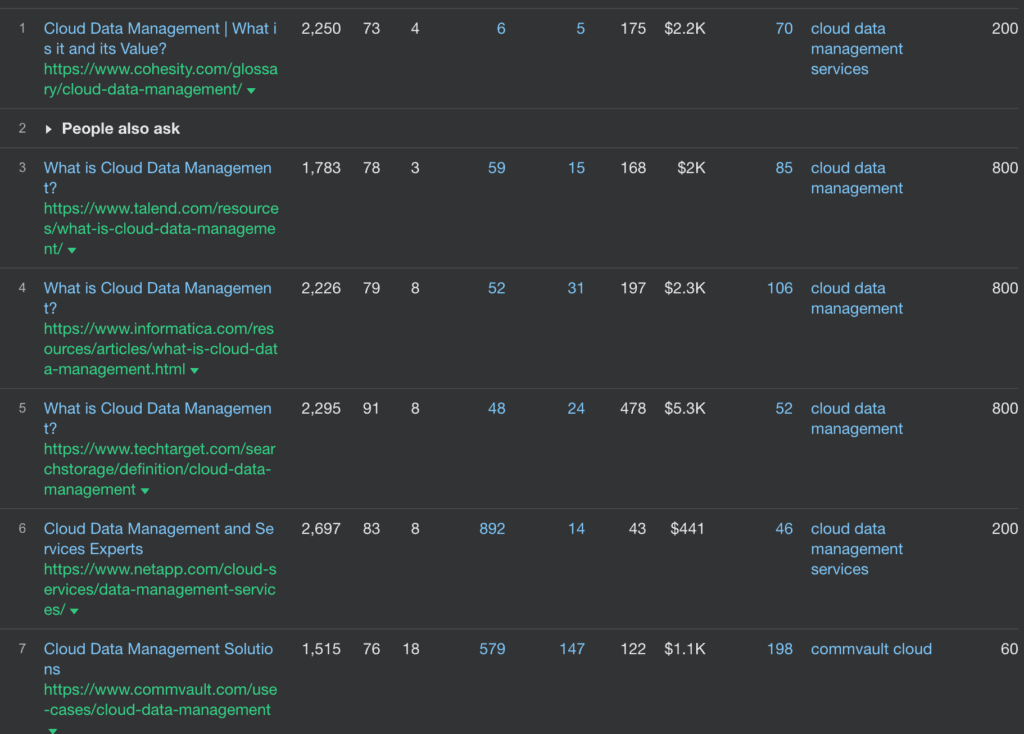
Depending on our priorities, this query could be used to build a blog to bolster our service page. After this, we can simply rinse-and-repeat this formula until we’ve identified several priority B2B keywords.
Another option is to take one of those service page’s in the top ten and put the URL in Ahrefs’ site explorer search bar. This will help us find queries that are ranking well for their page which, if our page is offering similar B2B content, should result in queries that match the intent of the service page.

Additionally, when conducting this kind of research we’ll want to keep in mind some items about the monthly search volume (MSV), keyword difficulty and, if you need buy-in from the higher-ups, estimated monthly traffic from specific ranking positions. First, MSV can oftentimes be an issue a lot of SEOs get stuck on early on in their careers. More MSV does not always mean valuable traffic. B2B’s main goal is to produce high-quality leads, which means targeting the queries that align the most with your content. That can often mean targeting queries with 20 or less MSV.
Secondly, high MSV B2B keywords are typically paired with high keyword difficulty. For the most part, we’ll want to avoid these keywords (depending on your site’s authority) and aim for keywords with a 30 KD and below.
And, though this contradicts the MSV point, if you’re struggling to get buy-in from stockholders or just want more understanding of how potential traffic could be viewed there is another metric I’ve used in the past that has helped out clients. This is the estimated monthly search volume given to the specific position of the ranking content.
For example, Deloitte is estimated to receive 440 monthly traffic for ranking in the #1 position for the keyword cloud managed services. This should be taken with a grain of salt, as ahrefs is a third-party tool, but it could provide a slightly better understanding of the value of targeting a new keyword.

The SERPs (Search Engine Result Pages)
Your last must-use tool is the SERPs themselves. Not only can you use the results to view search intent, but the People Also Ask (PAA) serves as another way for B2B companies to better understand how other businesses might be searching for the topic.
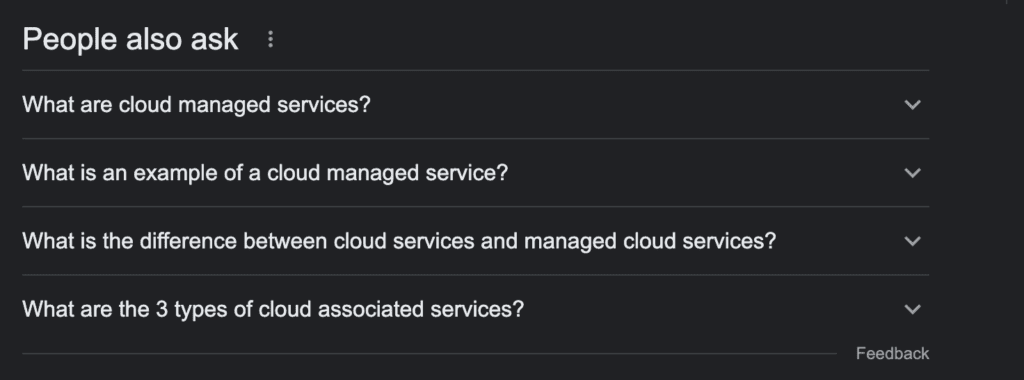
For example, the query cloud managed services produces a PAA with several questions a company could target with blog posts, or even their FAQ page such as: “what is the difference between cloud services and managed cloud services?” You should always make it a habit to look through the SERPs when identifying and optimizing for your B2B keywords.
Be Aware of Customer Pain Points
The last item to guide your B2B keyword research is to be aware of your potential customers’ pain points. One approach is to explore forums and message boards related to your industry or product. For example, by delving into Reddit threads or other user forums, you can identify pain points that are ripe for keyword targeting.
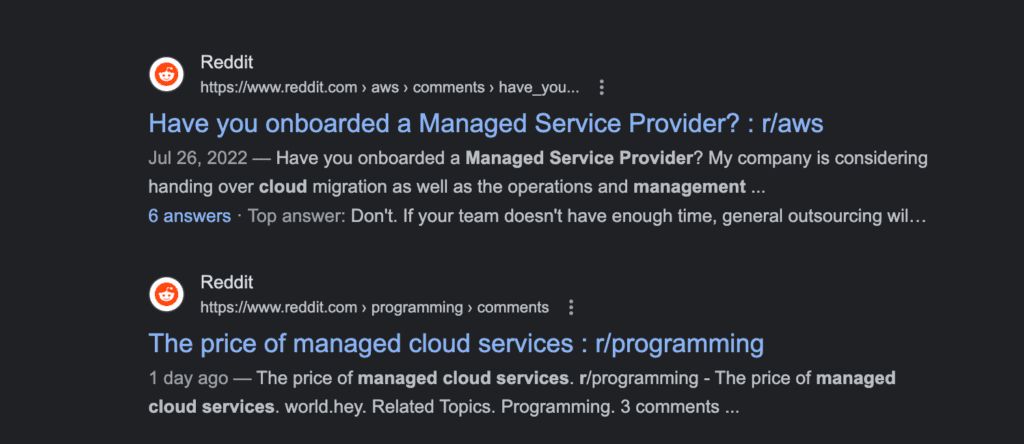
Additionally, competitive forums serve as another avenue to find pain points and potential keyword ideas. By examining discussions on competitor services, you can discover what users are struggling with, what features they desire, and other issues they encounter.
Another powerful source of pain points is customer testimonials, reviews, and interviews. This includes your own customer feedback, as well as testimonials from competitors. Engaging with your sales and customer service teams can help you find valuable information gathered from conversations with customers.
B2B Keyword Research in Summary
As you embark on your B2B keyword research journey, remember the value of search intent and choose the right B2B tools for the job, whether it’s Google Search Console, Ahrefs or the SERPs themselves. With these insights, you can navigate the competitive B2B landscape effectively and drive the growth your business deserves.
And remember, at the end of the day, B2B keyword research isn’t just about ranking higher in search results; it’s about connecting with your audience, delivering solutions, and ultimately, boosting your leads and revenue. So, embrace these strategies, keep your finger on the pulse of your industry, and watch your business thrive in the digital age.
Search News Straight To Your Inbox
*Required
Join thousands of marketers to get the best search news in under 5 minutes. Get resources, tips and more with The Splash newsletter: